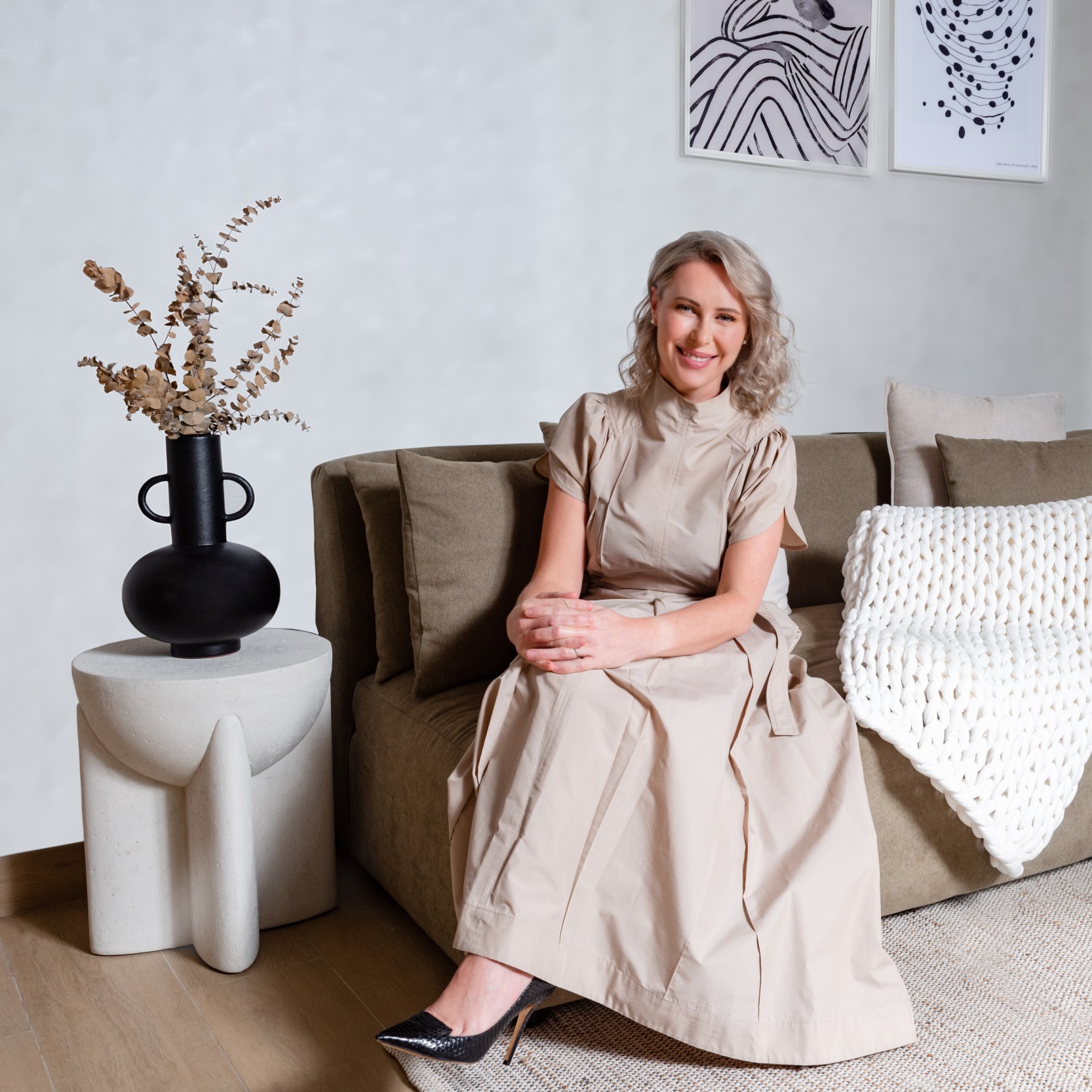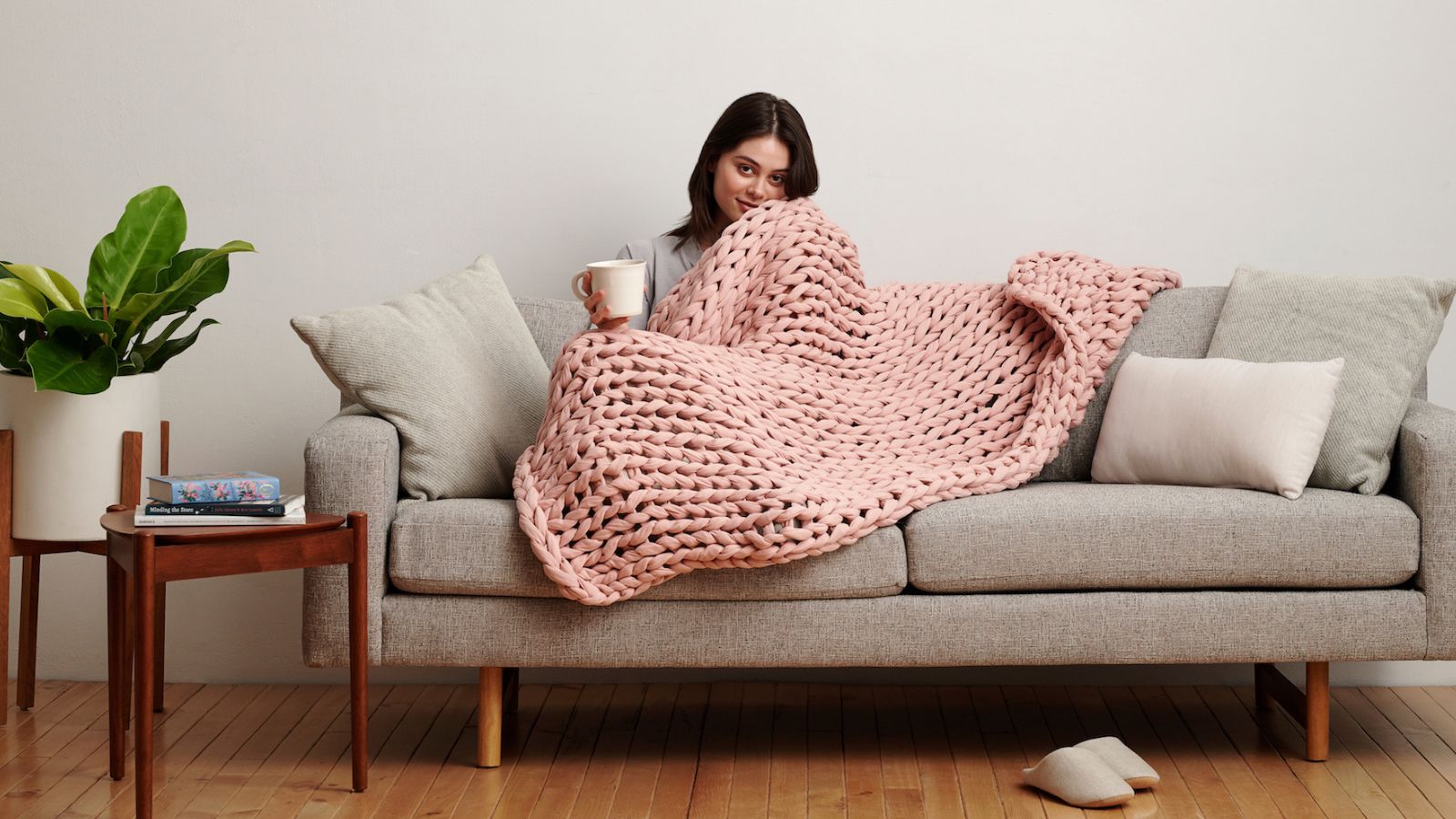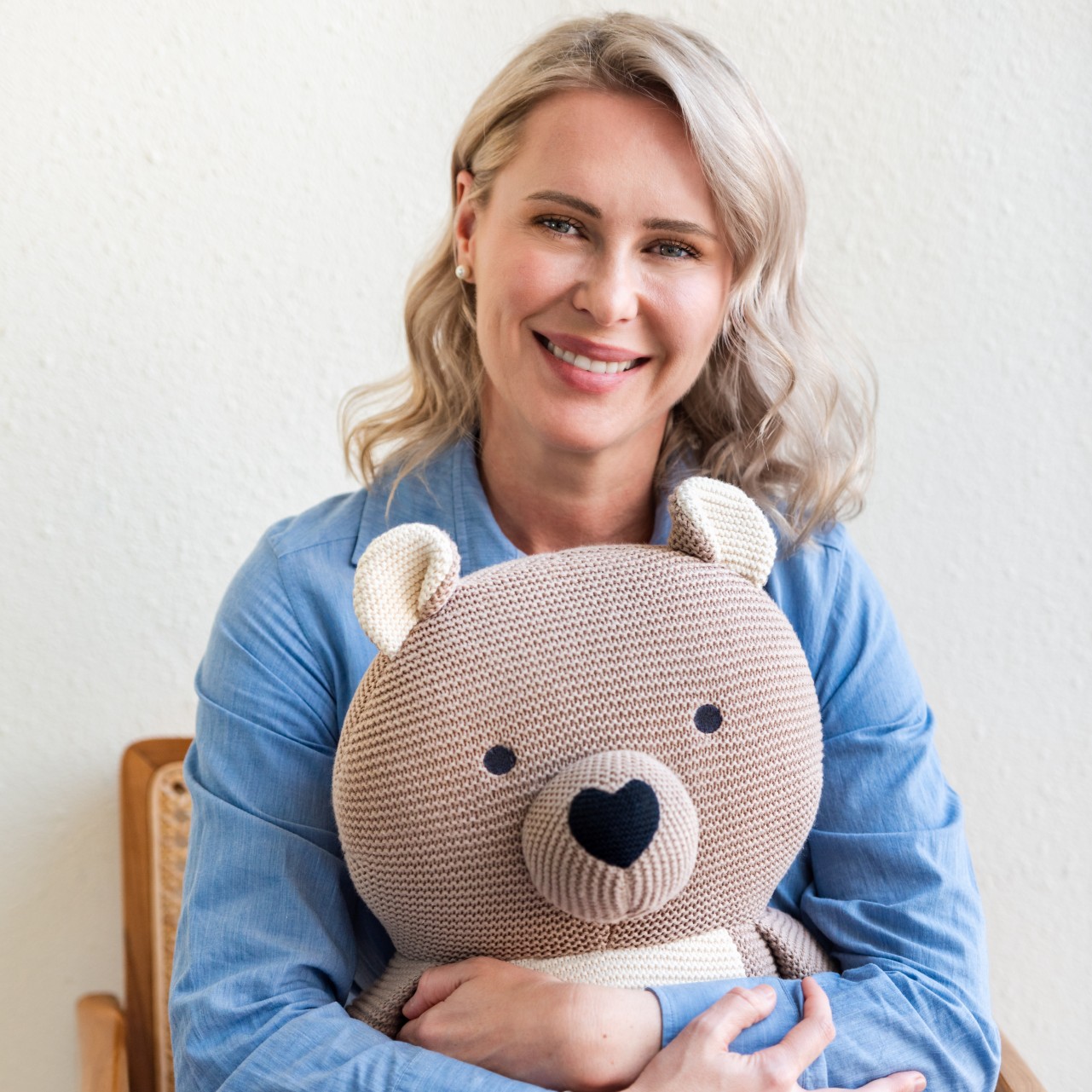
Before launching a weighted blanket brand, Kathrin Hamm worked for World Bank, one of the world's largest financial institutions. But constant travel meant constant jet lag and loss of sleep—a lifestyle that can lead to a long list of secondary conditions, like insomnia, irritability, headaches, and anxiety.
Then Hamm spent a Saturday afternoon beneath a weighted blanket.
Though weighted blankets were invented in the late 1990s, they were largely intended for medical use for children with sensory issues. Around 2017, weighted blankets entered the mainstream, becoming available in stores like Target.
Hamm first read about weighted blankets in a medical journal. After ordering her own, she discovered its benefits firsthand as a sleep aid. But she felt the product experience could use improvements—at the time, they were typically orange and blue monstrosities weighted with sand. Inspired by textiles she’d seen in her travels, Hamm began playing with fabrics and product development. In 2018, she launched her own company, Bearaby, with its signature Napper, having emptied her retirement fund. She promised herself a year to pursue the project.
By the end of 2020—the homebound, anxiety-ridden first year of the pandemic—Bearaby had hit eight figures in sales.
While the blankets, designed to be pretty knits weighted with sustainable cotton instead of pellet or sand, gained fans with their unique look and feel, the isolation of the era also ushered a rise in touch-starvation and heightened anxiety—emotions that could maybe, just maybe, be alleviated by the gentle pressure of a well-made weighted blanket.

With Bearaby now boasting 30 employees, Hamm names rest as one of its core values, encouraging staffers to find their own balance between work and rest.
“We find rhythms within the work week that keep us in sync and productive instead of implementing arbitrary mandatory online hours,” she says. “This practice allows our night owls to sleep in, and early risers a break in the afternoon to nap, exercise, or live their life.”
In the post-pandemic period, which has seen both the era of "quiet quitting" and the continuation of remote work—Bearaby itself boasts a combination of Brooklyn-based and remote workers—Hamm continues to advocate for nap culture, and for workers to find a daily rhythm in line with their need to rest.
Marie Claire: What was your career before Bearaby? What led you to develop a weighted blanket?
Kathrin Hamm: Before Bearaby, I was working at the World Bank as an economist. I constantly traveled and struggled with sleep due to the jet lag and time zone changes. I tried everything to help me get a good night's rest, but nothing felt sustainable long-term. My insomnia became chronic. I soon came across a weighted blanket… I remember vividly using a weighted blanket for the first time, waking up several hours later feeling rested and eager to share my experience with others.
While weighted blankets have been used in the medical community for decades, I had a lightbulb moment to create a product that would bring the incredible benefits of weighted blankets to a much wider consumer audience. We prioritized the design, look, and feel of the products, and sustainability was crucial in all stages of product development.
MC: What did it take to invent and develop a material-heavy product? Where do you manufacture?
KH: An important moment in the invention process took place at home in my mom’s kitchen! One day, my mom came into our kitchen with a big roll of T-shirt cotton. She started cutting the cotton into small strips and then stitched them together into a type of layered cotton yarn, and I realized how heavy it was. We tried knitting a mini blanket out of the layered fabric and found that it was heavy, soft, and made a beautiful pattern, all at the same time. That’s when I realized we had created something really special.
Most of our production is in India, with additional partners in Guatemala and Sri Lanka. Bearaby is a decidedly sustainable company from loom to lap. With every product we produce, every partner we work with, and every decision we make, we put the planet first, and we have about half a dozen certifications to prove it.
MC: What was the biggest challenge you faced in getting the company started? How did you navigate that obstacle?
KH: Manufacturing. After talking to 48 manufacturers. I got 48 "No"s. So, after all those rejections, we rented a garage with two knitting machines and essentially launched out of my living room.
MC: Roughly how much did you invest?
KH: To launch the business, I emptied my retirement savings to start prototyping, about $120K. As soon as the product was ready, I crowdsourced $250,000 on Kickstarter to fulfill my first orders. When what I thought would be a three-month supply of inventory ended up selling out in two days, I knew I was onto something!
Rest should be guilt-free, and taking time in your day to recharge is crucial to staying productive.
MC: Tell us about a major milestone and what was it like to achieve that as an entrepreneur.
KH: The Kickstarter I mentioned was one of the earliest signs that we were on to something meaningful, but it was followed by several other "pinch me moments" in the years that followed. When we launched the Tree Napper in 2019, it sold out almost immediately, and we garnered a waitlist of nearly 80,000–the demand for our product skyrocketed, and this was a huge milestone for the growth of the business. At this stage, we were still almost entirely DTC.
There have also been a few milestones on the sustainability front that are really special to me. Bearaby is now proudly Plastic Negative certified. And because we use organic fabrics, we’re utilizing farming methods that require significantly less water than conventional methods–over the past five years our dedication to organic materials has saved more than 5.3 billion liters of water from our cotton and Tencel production.
MC: How did you develop a company that is very popular in the U.S. around napping culture, particularly as the U.S. doesn’t necessarily nap?
KH: Growing up, it was entirely normal to take a midday nap, so when I moved to the U.S., it surprised me that napping, as an adult practice, was almost frowned upon. There’s been enormous progress in embracing rest as a driver for productivity and overall health, but sleep disorders and anxiety remain top health issues in the US. And that’s also why I believe in our mission to prioritize rest.
MC: How have you incorporated napping in Bearaby’s company culture?
KH: By implementing accommodating work hours and fostering a no-judgment culture when it comes to taking a nap when needed.
I lead by example. I am transparent about the fact I take a nap almost every single day. Napping is important to me because as someone who has been in the throes of insomnia, I’ve experienced first-hand how sleeplessness can be detrimental to your everyday life. Napping is a natural, simple, and accessible habit that can help boost productivity and overall wellness. Everyone shouldn’t necessarily nap, but everyone should be allowed the option to rest when needed, without it having to be frowned upon, especially in the workplace.

MC: How can individuals incorporate napping into their daily routines? What are your tips? What works well for you?
KH: The first step is to let go of the guilt that often comes from prioritizing napping. Rest should be guilt-free, and taking time in your day to recharge is crucial to staying productive.
The best tip is to find a supportive sleep tool that works for you, whether that’s popping on an eye mask or cuddling with something soft. Find something sensory that tells your body it’s time to wind down and reset.
And timing is also key—naps that are too short can leave you feeling groggy and dazed, whereas naps that are too long unsettle bedtime routines. For most people, a 20-30 minute power nap is the ideal, but everyone needs to find their own sweet spot.
MC: How do you stand out amongst the dupes and copycats? How do you protect your business from this?
KH: Patents! We hold more than a dozen patents and various trademarks. Patents are a lengthy process and expensive to earn, but it's so worth it to protect the proprietary design that we worked so hard to make in the first place. There's a massive "patent gap" in the U.S.—less than 13% of patents are held by women, and despite the increasing rate of female inventors, this gap isn't expected to reach parity until the 2060s. I want to shed more light on the patent process and encourage more female founders to engage.
MC: What are some of the exciting brand moments you are looking forward to in 2024?
KH: Partnerships! We've seen great success in this last year in partnering with other respected companies in the wellness community, like Sage + Sound and The Well. These two partners in particular have also provided us with physical locations and activations where people can experience Bearaby IRL, which we're learning a lot from. I'm always energized when I see a great collaboration between brands, and I'm hopeful that 2024 will be the year we are able to flex that muscle.







